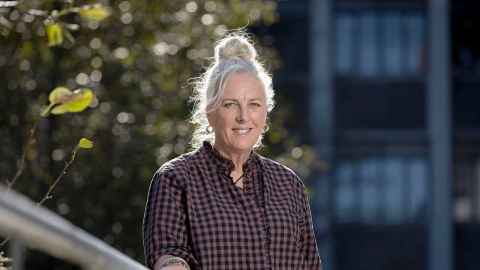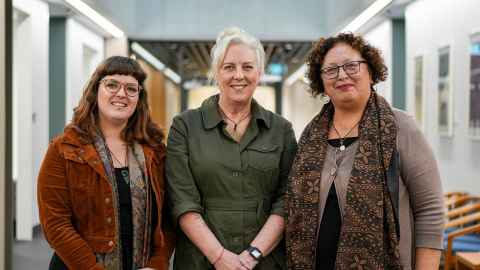Lisa Reynolds: LSD and the healing power of nature
1 August 2024
Health psychologist Dr Lisa Reynolds is venturing into bold new territory to help alleviate the distress experienced by those facing the ‘big questions’ of their mortality due to cancer.

Dr Lisa Reynolds is drawing on her deep desire to help the cancer patients she has worked with clinically for almost two decades to explore new therapies harnessing microdosing of psychedelics.
“I would like to support people with the big questions that come up for them and the enormous challenges when they are facing their own mortality,” says Lisa, who is a health psychologist and senior lecturer in the School of Psychological Medicine.
“These are not straightforward or easy things to help people with. Perhaps it’s partly around my own life stage and my own losses, but it feels like fundamentally important work.
“If you can support people to connect in some way with what’s important and purposeful to them, then that’s a real gift, supporting them to live a life that is meaningful to them.”
Her initial interest in the psychedelic LSD came from reading Michael Pollan’s book How to Change Your Mind, which had a chapter on early research showing the benefit of its use in cancer patients to alleviate feelings of existential distress, isolation, depression and anxiety.
During the course of her own research, she discovered two independent studies from 2016. In one study, patients reported enduring benefits from a psychedelic called psilocybin four or five years later.
Lisa’s current microdosing trial offers LSD, or a placebo, alongside meaning-centred psychotherapy that has already proven to be beneficial.
It is a feasibility study involving 40 participants with late-stage cancer and, now a third of the way through, some patients are already reporting real benefit from it.
“It is still unclear how LSD works, but some theories suggest it works on neurotransmitter pathways and increases connectivity within the brain,” says Lisa.
It also fosters a sense of connection with others at a time when people commonly feel isolated.
Another University of Auckland trial Lisa is currently working on is testing high doses of MDMA, or ecstasy, in people with advanced cancer.
I would like to support people with the big questions that come up for them.
Lisa says her mother’s illness and death from breast cancer was a foundational experience for her future career.
“I remember very vividly how unsupported and isolated she was. But also, we, her family, having our own grief and loss, felt very much left to our own devices.
“I remember, at that time, thinking I wanted to become a psychologist. But I knew I wasn’t ready,” she recalls.
She did other things, including an MBA and work in marketing.
It was when her two children were very young that she decided to return to university to realise her long-held dream.
In 2005, Lisa gained a Master of Science in health psychology with first class honours. It was while working towards that degree, that her young nephew developed a brain tumour and died.
“These two pivotal losses really informed my desire to work in the area of cancer generally, but specifically with people at the end of life.”
In 2008, a doctorate followed, researching a mindfulness intervention for cancer patients.
Growing up in Waiuku, her father, a metallurgist for New Zealand Steel, practised transcendental meditation, which could have been an influence, plus, Lisa has had her own meditation practice.
These days, being in nature is her biggest form of meditation, and she and her husband Neil opted to live in Piha to foster that connection to the outdoors.
“The Waitākere Ranges are a special place. There’s a spiritual sense that feels quite palpable,” she says.
In her spare time, as well as tramping, Lisa has a ‘side-hustle’ making apothecary-like room sprays, using distilled native botanical bases and essential oils, such as mānuka and kānuka.
“I am trying to create products that are like forest bathing in a bottle. So that if you close your eyes, you can imagine you are immersed in nature.”
During our interview, Lisa sprayed ‘recovery’ in her office, and the fresh floral scents and grounding base notes created a feeling of sitting beside a waterfall. Her idea is that if you are in a situation, like being unwell in hospital, you could use these products and gain the therapeutic benefits of being in nature.
Lisa sells small batches of her products via Instagram under the brand name MotherTree, which was inspired by a book she loves, called Finding the Mother Tree, by Suzanne Simard.
“There are mother trees that have been there for hundreds of years that have created a nursery under their branches and leaves. They send messages to their younger kin and nurture and protect the other trees around them.”
Plants and nature are an important feature of the therapy room where she conducts her research at Waipapa Taumata Rau, where there’s a beautiful feather korowai on the wall, a comfortable leather couch and an artwork that looks like a photographic print of an aurora.
Lisa, along with doctoral student Alesha Wells (Ngāti Awa) and health psychologist, long-time colleague and close friend Eva Morunga (Ngāpuhi, Te Rarawa), are looking forward to writing up the results of the study later next year.

Meanwhile, they are aiming to recruit 50 percent (20) Māori patients into the trial.
Lisa says she has long felt a strong connection with Māori people and culture.
“For me, being Pākehā means living in a place where part of what makes New Zealand special is tangata whenua.”
Her friendship with Eva has been long and profound, as evidenced by a story she recounts.
“My grandmother grew up in a settlement called Ruru on the West Coast of the South Island. Over the whole of her life, she looked across Lake Brunner to a mountain called Te Kinga and she always wanted to go to the top,” says Lisa.
“But, when she died, my adult children took her ashes to the top to spread them.
“It is a decent mountain and as they were walking up, there were about 20 pīwakawaka who surrounded them and, as they left the treeline, the pīwakawaka continued to fly around them.”
When Lisa related the story of these events, which took place only about a year ago, Eva told her that the birds were acting as their korowai.
“The mountain was welcoming them and allowing them to do that.”
That sense of awe is something Lisa is exploring in both the LSD study, and one involving virtual reality.
“We are using virtual reality to induce a sense of awe in people, particularly through experiences of New Zealand nature.
“One of the things we know about awe is it can help you shift perspective.”
For people going through the challenging experience of cancer treatment, where their focus has become narrower than usual, these are therapies that could help shift their focus, she says.
“When you see something that stops you in your tracks – the first blossom of spring or a full moon that is particularly bright, whatever it might be that gives you goosebumps – for a moment you feel small in the universe and get a sense of being connected to something much larger.
“That seems like an especially useful experience for people who are facing any kind of illness that has an impact on mortality.”
Jodi Yeats
This story first appeared in the August 2024 issue of UniNews.